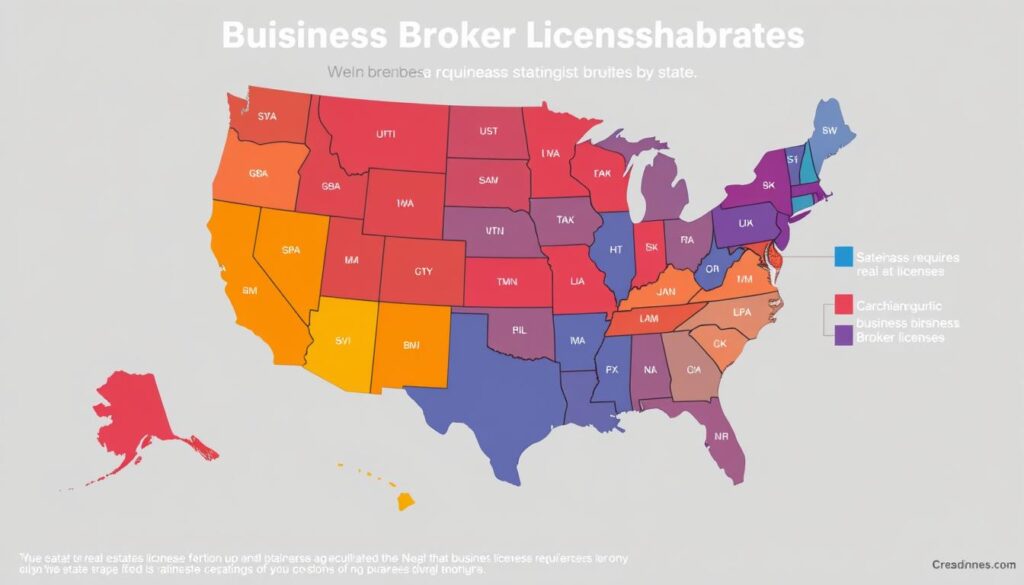Considering a career as a business broker? You’re looking at a profession that combines financial analysis, negotiation skills, and relationship building into one rewarding package. Business brokers serve as the crucial intermediaries who help business owners sell their companies and assist buyers in finding the right acquisition opportunities. With the potential for six-figure earnings and the satisfaction of helping entrepreneurs transition through important life changes, business brokerage offers an attractive career path for those with the right skills and determination.
Business brokers facilitate transactions between business sellers and buyers
What Is a Business Broker and What Do They Do?
A business broker is a professional who acts as an intermediary between buyers and sellers of businesses. Think of them as the real estate agents of the business world, but with a much more complex role. While real estate agents primarily deal with property, business brokers handle the intricate process of valuing, marketing, and transferring business entities.
Business brokers play a crucial role in the mergers and acquisitions marketplace, particularly for small to mid-sized businesses. They help owners determine the right time to sell, establish realistic asking prices, find qualified buyers, and navigate the complex legal and financial aspects of the transaction.
Key Responsibilities of Business Brokers
- Valuing businesses using various financial methodologies
- Creating comprehensive marketing packages for businesses
- Identifying and screening potential buyers
- Maintaining confidentiality throughout the sales process
- Negotiating terms between buyers and sellers
- Coordinating with attorneys, accountants, and lenders
- Assisting with due diligence processes
- Facilitating the closing of transactions
Business brokers typically work with businesses valued between $50,000 and $5 million, though some specialize in larger transactions. They earn their income through commissions, which generally range from 8-12% of the final sale price for small businesses, with the percentage decreasing as the transaction size increases.
Essential Skills and Qualities for Success as a Business Broker
Becoming a successful business broker requires a diverse skill set that combines financial acumen, people skills, and business knowledge. Before pursuing this career path, assess whether you possess or can develop these critical abilities:
Financial Analysis
Business brokers must understand financial statements, cash flow analysis, and various valuation methods. You’ll need to interpret balance sheets, income statements, and tax returns to accurately determine a business’s worth. This skill allows you to set realistic asking prices and explain valuation rationales to both sellers and buyers.
Negotiation Skills
The ability to negotiate effectively is perhaps the most critical skill for a business broker. You’ll often need to bridge significant gaps between seller expectations and buyer offers. Strong negotiators can find creative solutions to seemingly deadlocked situations while maintaining positive relationships with all parties involved.
Industry Knowledge
Understanding various business models and industry-specific factors that affect valuation is essential. Experienced brokers develop expertise in particular sectors, allowing them to better serve clients in those industries. This specialized knowledge becomes a competitive advantage in attracting both buyers and sellers.
Marketing Expertise
Successfully marketing a business while maintaining confidentiality requires specialized marketing skills. You’ll need to create compelling business summaries, identify target buyer groups, and utilize both traditional and digital marketing channels to reach qualified prospects without revealing sensitive information.
Communication Skills
Clear communication is essential when explaining complex financial concepts, managing client expectations, and facilitating negotiations. Business brokers must be adept at both written and verbal communication, with the ability to adjust their style based on their audience’s background and knowledge level.
Emotional Intelligence
Selling a business is often an emotional process for owners who have invested years of their lives building their companies. Effective brokers recognize and manage these emotions while keeping transactions on track. This requires empathy, patience, and the ability to build trust with clients during a significant life transition.
Ready to Join a Quality Brokerage?
Join our free webinar to learn how successful business brokers master these essential skills and build thriving practices.
Educational Background and Certifications
While there’s no single educational path to becoming a business broker, certain academic backgrounds and professional certifications can give you a significant advantage in this field. Here’s what you should know about education and credentials for business brokerage:
Recommended Educational Backgrounds
Though business brokerage doesn’t require a specific degree, certain educational backgrounds provide valuable foundations:
- Business Administration – Provides broad understanding of business operations, management, and finance
- Finance – Offers critical knowledge of financial analysis, valuation methods, and capital structures
- Accounting – Helps with interpreting financial statements and understanding tax implications
- Economics – Provides insights into market forces and economic factors affecting business values
- Real Estate – Offers transferable skills in sales, valuation, and transaction management
Professional Certifications
Industry certifications demonstrate your commitment to professional standards and specialized knowledge. The most recognized certifications include:
| Certification | Offering Organization | Requirements | Benefits |
| Certified Business Intermediary (CBI) | International Business Brokers Association (IBBA) | 68 hours of courses, passing exam, experience requirements, continuing education | Industry-recognized credential, access to resources, referral network |
| Merger & Acquisition Master Intermediary (M&AMI) | M&A Source | CBI certification, additional coursework, deal experience | Advanced credential for larger transactions, specialized knowledge |
| Certified Business Broker (CBB) | Business Brokerage Press | Training program, exam, experience requirements | Comprehensive business brokerage education, industry recognition |
| Certified Business Valuation Analyst (CBVA) | National Association of Certified Valuators and Analysts | Training, exam, professional experience | Specialized valuation expertise, credibility with clients |
Continuing Education
Business brokerage is a field that requires ongoing learning. Industry associations offer continuing education through:
- Annual conferences and workshops
- Online courses and webinars
- Industry publications and research
- Peer networking and mentorship opportunities
Many successful business brokers also pursue additional education in specialized areas such as tax planning, exit strategies, or industry-specific knowledge to better serve their clients and differentiate themselves in the marketplace.
Licensing Requirements by State
One of the most important considerations when becoming a business broker is understanding the licensing requirements in your state. These requirements vary significantly across the United States, with some states requiring real estate licenses, others having specific business broker licenses, and some having no specific licensing requirements at all.
States Requiring Real Estate Licenses
In many states, business brokers must hold a real estate license because the sale of a business often involves real property. In these states, you’ll need to:
- Complete pre-licensing education (typically 60-90 hours)
- Pass the state real estate licensing exam
- Submit to background checks
- Affiliate with a licensed real estate brokerage
- Complete continuing education to maintain your license
Examples of states requiring real estate licenses include California, Florida, Michigan, and Texas.
States with Specific Business Broker Licenses
Some states have created specific licensing categories for business brokers that are separate from real estate licensing. These often have requirements tailored to the business brokerage profession.
Examples include Wisconsin, which offers a specific business broker registration, and Minnesota, which has a “limited broker” license for those who only handle business sales without real estate.
States with No Specific Licensing Requirements
In some states, no specific license is required to operate as a business broker when the transaction doesn’t involve real estate. However, other regulations may still apply, such as:
- Securities licensing requirements for certain types of transactions
- General business licensing
- Registration with state agencies
Important Note: Licensing requirements can change, and the specifics can be complex. Always verify current requirements with your state’s regulatory agencies before beginning practice as a business broker. Additionally, even in states without specific licensing requirements, professional certification is highly recommended to establish credibility.
Get Your State-Specific Licensing Guide
Download our comprehensive state-by-state guide to business broker licensing requirements to understand exactly what you need in your location.
Gaining Experience Through Internships and Mentorship
The business brokerage profession has a significant learning curve that’s difficult to master through education alone. Hands-on experience is crucial for developing the practical skills and industry knowledge needed for success. Here are effective strategies for gaining valuable experience:
Working with Established Brokerage Firms
One of the most direct paths to gaining experience is joining an established business brokerage firm. Consider these approaches:
- Entry-Level Positions – Many firms hire assistants, researchers, or marketing coordinators who support senior brokers while learning the business
- Commission-Based Roles – Some firms offer commission-only positions for new brokers, providing training in exchange for a split of future commissions
- Internships – Formal or informal internships with brokerage firms can provide valuable exposure to the profession
When approaching firms, emphasize transferable skills from your background, demonstrate your willingness to learn, and express commitment to the profession. Be prepared for a period of limited income while you build your knowledge and client base.
Finding a Mentor
A mentor relationship with an experienced business broker can dramatically accelerate your learning curve. Here’s how to establish effective mentorships:
- Attend industry association meetings to meet potential mentors
- Offer value to experienced brokers by assisting with research or marketing
- Consider formal mentorship programs through organizations like the IBBA
- Be specific about what you hope to learn from the relationship
- Respect your mentor’s time and demonstrate your commitment to growth
“The most valuable education I received wasn’t from courses or books—it was sitting across the table from my mentor during negotiations and seeing how he handled complex situations that no textbook could prepare you for.”
Learning Through Related Experience
If direct business brokerage experience isn’t immediately available, consider gaining experience in related fields:
- Commercial Real Estate – Develops relevant sales, valuation, and transaction skills
- Business Banking – Provides insight into business financing and financial analysis
- Accounting or Financial Advisory – Builds critical financial analysis capabilities
- Business Consulting – Develops understanding of various business models and operations
- Business Ownership – Provides firsthand knowledge of business operations and challenges
Creating Learning Opportunities
Be proactive in creating your own learning experiences:
- Offer to assist with specific aspects of transactions (e.g., market research, creating marketing materials)
- Shadow experienced brokers during appropriate client interactions (with client permission)
- Request feedback on your work and approach to specific situations
- Study completed transactions to understand what made them successful
- Participate in role-playing exercises to practice negotiation and client interactions
Connect with Experienced Business Brokers
Join our mentorship matching program to connect with established business brokers willing to share their knowledge and experience with newcomers to the profession.
Building a Professional Network
Success in business brokerage depends heavily on your professional network. A strong network provides deal flow, referrals, resources, and support throughout your career. Here’s how to build and maintain an effective professional network:
Industry Associations and Events
Professional associations provide structured networking opportunities and valuable resources:
- International Business Brokers Association (IBBA) – The largest international association for business brokers, offering conferences, education, and networking
- M&A Source – Focused on professionals handling larger middle-market transactions
- State and Regional Associations – Many states have their own business broker associations with local networking events
- Industry Conferences – Annual events bring together brokers, buyers, sellers, and service providers
When attending events, come prepared with business cards, a concise introduction of your services, and thoughtful questions for those you meet. Focus on building relationships rather than immediate business opportunities.
Building Relationships with Allied Professionals
Develop connections with professionals who work with the same client base:
Key Referral Sources
- Business attorneys
- CPAs and accountants
- Financial advisors
- Commercial bankers
- SBA lenders
- Business consultants
- Commercial real estate agents
- Exit planning specialists
Relationship Building Strategies
- Schedule one-on-one meetings to understand their services
- Attend their industry events and invite them to yours
- Provide value through information sharing and referrals
- Co-host educational events for business owners
- Share relevant articles and resources
- Recognize and thank them for referrals
Online Networking
Establish a professional online presence to extend your networking reach:
- LinkedIn – Create a comprehensive profile, join industry groups, share relevant content, and connect with professionals in your target market
- Professional Directory Listings – Maintain profiles on industry directories and association websites
- Online Forums – Participate in discussions on platforms where business owners gather
- Webinars and Virtual Events – Attend or host online educational events to connect with potential clients and referral sources
Maintaining Your Network
Building a network is just the beginning—maintaining it requires ongoing effort:
- Schedule regular check-ins with key contacts
- Create a system for tracking relationships and follow-ups
- Share valuable information and resources without expecting immediate returns
- Acknowledge and celebrate others’ successes
- Be responsive when your network reaches out to you
- Look for opportunities to connect people within your network
Networking Tip: Quality matters more than quantity. Focus on building genuine relationships with professionals who serve your target market rather than collecting as many contacts as possible.
Marketing Strategies for Attracting Clients
Effective marketing is essential for business brokers to attract both buyers and sellers. A strategic marketing approach helps establish your expertise, build trust, and generate a steady flow of qualified leads. Here are proven strategies for marketing your business brokerage services:
Establishing Your Online Presence
In today’s digital world, a strong online presence is non-negotiable:
- Professional Website – Create a website that clearly communicates your services, expertise, and value proposition. Include resources for buyers and sellers, testimonials, and case studies.
- Business Listing Sites – Maintain profiles on business-for-sale websites where buyers search for opportunities.
- Social Media – Develop a strategic presence on platforms like LinkedIn, where business owners and buyers are active.
- Content Marketing – Publish articles, guides, and videos that demonstrate your expertise and address common questions.
- Email Marketing – Build and nurture a database of contacts with regular, valuable communications.
Direct Outreach Strategies
Proactive outreach helps you connect with potential clients who aren’t actively searching for your services:
For Potential Sellers
- Targeted direct mail campaigns to business owners in specific industries or regions
- Educational workshops on business valuation or exit planning
- Networking at industry-specific events where business owners gather
- Strategic partnerships with accountants, attorneys, and financial advisors who can refer clients
- Cold calling campaigns focused on businesses that match your expertise
For Potential Buyers
- Buyer registration systems on your website
- Educational seminars on buying a business
- Networking with corporate executives who may be considering entrepreneurship
- Partnerships with outplacement services for executives
- Targeted advertising to professionals with transferable skills
Building Credibility and Trust
Business brokerage requires significant trust. These strategies help establish your credibility:
- Case Studies – Share anonymized success stories that demonstrate your ability to overcome challenges
- Testimonials – Collect and showcase feedback from satisfied clients
- Industry Recognition – Pursue awards, certifications, and speaking opportunities
- Media Coverage – Develop relationships with business journalists and contribute expert commentary
- Publishing – Write articles for industry publications or consider authoring a book
Specialized Marketing Approaches
Consider these specialized strategies to differentiate your practice:
- Industry Specialization – Focus your marketing on specific industries where you have expertise
- Geographic Focus – Become the recognized expert in a particular region or community
- Transaction Size Specialization – Target businesses within a specific valuation range
- Situation-Specific Marketing – Focus on particular scenarios like family business succession or distressed sales
Measuring Marketing Effectiveness
Track your marketing efforts to optimize your approach:
- Monitor website traffic and conversion rates
- Track the source of each lead and client
- Calculate the cost per lead for different marketing channels
- Gather feedback from prospects about how they found you
- Regularly review and adjust your marketing strategy based on results
Common Challenges and Tips for Success
The business brokerage profession offers significant rewards but also presents unique challenges. Understanding these challenges and implementing proven strategies can help you navigate the difficulties and build a successful practice.
Common Challenges in Business Brokerage
Challenges
- Inconsistent Income – Commission-based compensation can lead to significant income fluctuations
- Long Sales Cycles – Business sales typically take 6-12 months to complete
- Deal Fatigue – Complex transactions can face multiple obstacles before closing
- Unrealistic Expectations – Sellers often overvalue their businesses
- Confidentiality Requirements – Marketing must attract buyers without revealing sensitive information
- Emotional Sellers – Business owners may have strong emotional attachments affecting decisions
- Financing Difficulties – Securing funding for buyers can be challenging
Success Strategies
- Financial Planning – Maintain reserves to weather income fluctuations
- Pipeline Management – Work multiple deals at different stages
- Persistence – Develop strategies to overcome common obstacles
- Valuation Expertise – Use market data to establish realistic pricing
- Marketing Systems – Develop effective confidential marketing approaches
- Emotional Intelligence – Help clients navigate emotional aspects of selling
- Financing Knowledge – Build relationships with lenders and understand options
Tips from Successful Business Brokers
“The most successful business brokers I know are those who become true advisors to their clients, not just transaction facilitators. When you genuinely understand a business owner’s goals and concerns, you can structure deals that address their needs beyond just the sale price.”
- Specialize in an industry or niche – Developing expertise in specific types of businesses allows you to understand their unique valuation factors, find qualified buyers more efficiently, and become the go-to broker in that space.
- Invest in continuous education – The business landscape constantly evolves. Successful brokers stay current on industry trends, tax laws, financing options, and valuation methodologies.
- Build a professional support team – Develop relationships with attorneys, accountants, lenders, and other professionals who can help address specific aspects of transactions.
- Focus on quality listings – Be selective about the businesses you represent. Businesses with accurate financial records, realistic seller expectations, and strong fundamentals are more likely to sell.
- Develop systems and processes – Create standardized approaches for listing intake, buyer screening, marketing, and transaction management to increase efficiency.
- Maintain a long-term perspective – Build relationships even when they don’t lead to immediate transactions. Today’s casual conversation might become next year’s million-dollar listing.
- Practice transparent communication – Set realistic expectations with clients from the beginning and provide honest feedback throughout the process.
Getting Started Checklist
Business Broker Launch Checklist
- Research licensing requirements in your state
- Obtain necessary licenses and certifications
- Join professional associations (IBBA, state associations)
- Develop a business plan with financial projections
- Create marketing materials and online presence
- Build a database of potential referral sources
- Establish relationships with allied professionals
- Set up systems for tracking clients and deals
- Develop standardized documents and processes
- Create a continuing education plan
- Identify mentors or coaches in the industry
- Establish financial reserves for the startup period
Conclusion: Your Path to Becoming a Business Broker
Becoming a successful business broker requires a unique combination of financial acumen, people skills, and business knowledge. While the path may present challenges, the rewards—both financial and personal—can be significant. As a business broker, you’ll guide entrepreneurs through critical transitions, helping sellers realize the value of their life’s work and assisting buyers in finding opportunities that match their goals and capabilities.
The profession offers flexibility, intellectual stimulation, and the opportunity to work with a diverse range of businesses and entrepreneurs. For those willing to invest in developing the necessary skills and building a strong professional network, business brokerage can provide a rewarding long-term career.
Remember that success in this field rarely happens overnight. Be prepared for a learning curve as you develop expertise and build your reputation. With persistence, continuous learning, and a client-centered approach, you can establish yourself as a trusted advisor in the business sales marketplace.
Ready to Start Your Business Broker Career?
Schedule a consultation with one of our experienced business brokers to discuss your career transition plan and get personalized advice on entering the profession.











